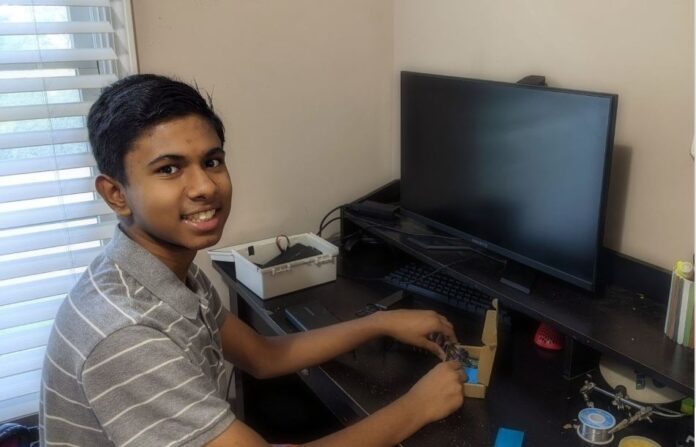Seventh grader Om Guin saw firsthand the impact asthma has on several family members living with the disease.
That inspired him to invent a tool that can detect bad air quality, a primary factor in aggravating lung diseases.
That’s why the Lemelson Foundation awarded Guin this year’s annual Early Inventor Award.
Guin attends Fulton Science Academy Private School in Alpharetta, Georgia.
The Lemelson Early Inventor Award is presented to outstanding young innovators whose work “exemplify the ideals of inventive thinking by identifying challenges in their communities and creating solutions that will improve lives.”
According to Indicanews, several people from Guin’s family suffer from asthma. He became curious about the disease after observing them take strict measures, such as checking pollen counts, before venturing outside. This led him to learn more about what causes and aggravates lung diseases.
Through his extensive research and other observations, Guin found several studies which show that air quality indoors is not much better than those outdoors.
With the pandemic and work-from-home situations, as well as the fact that people spend much of their time inside, the issue of air quality is especially alarming. Many might assume that the air surrounding them is excellent, but unfortunately, that is almost always not the case. Because of this, Guin began to think of solutions to improve air quality not only for his family, but for others who suffer the same fate.
According to the Society for Science, Guin used a “forced-air, laser-based sensor to build a pair of devices that measure and record the particulate matter content of the air at frequent intervals.” Particulate matter (PM) suspended in air is a major cause of aggravation of lung and heart problems, according to the United States Environmental Protection Agency.
The Centers for Disease Control and Prevention (CDC) states that sources of PM can be traced to wood stoves, forest fires, power plants, other industrial facilities, construction sites, and even everyday vehicles such as cars and trucks.
In an online article, Society for Science states that Guin’s invention is capable of measuring PM up to 0.3 microns in size. This is beyond astonishing because the CDC website places importance on detecting fine particles – PM2.5 – which are “more dangerous because they can get into the deep parts of your lungs — or even into your blood.” Guin’s incredible invention will make it easier to detect even smaller traces of PM in the air.
“Om then connected a Raspberry Pi Zero [a tiny, single board computer] to the interface of the sensor to record the measurements and wrote a Python script to turn on the sensor every five minutes and record the data in a file. The two devices communicate with each other over Wi-Fi to exchange sensor data.”
Guin calls his device “Lungsaver,” and by comparing the readings of the two sensor devices over a period of several months, he was able to test the system’s functionality and accuracy. With those data in hand, Guin performed a paired-t-test to establish that the indoor and outdoor measurements had “significant differences at a 95% level of confidence.”
Last year, The Lemelson Foundation also honored Guin with the same award for his creation of the voice-enabled smart pillbox. He expressed his enthusiasm for receiving the award two years in a row by saying, “I was excited to know that even I can be an inventor. Last year’s prize inspired me to continue looking for problems that I can solve. All it takes is a deep look at an everyday problem and some thinking,” Guin said.
Support our June Membership Drive and receive member-only benefits. With less than three days left in our fundraising drive, we are running out of time. We are just 53% of our goal of $10,000 in new donations and monthly and annual donation pledges and 44% of our goal of gaining 25 new recurring donors by the end of the month. We need your help during these challenging times. Please help to ensure quality content in amplifying the voices of the AAPI community.
We are published by the non-profit Asian American Media Inc and supported by our readers along with the Robert Wood Johnson Foundation, AARP, Report for America/GroundTruth Project & Koo and Patricia Yuen of the Yuen Foundation.
You can make your tax-deductible donations here via credit card, debit card, Apple Pay, Google Pay, PayPal and Venmo. Stock donations and donations via DAFs are also welcomed. Contact us at info @ asamnews dot com for more info.




